- Home
- William Gibson
Mona Lisa Overdrive Page 19
Mona Lisa Overdrive Read online
Page 19
“Dunno.”
“You shoulda asked him.”
He shrugged again. “Seen Bird anywhere?”
“No.”
“Shoulda been back already …” He stood up.
Little Bird came back at dusk, on Gentry’s bike, the dark wings of his hair damp with snow and flapping behind him as he roared in across the Solitude. Slick winced; Little Bird was in the wrong gear. Little Bird jolted up an incline of compacted oildrums and hit the brakes when he should’ve gunned it. Cherry gasped as Bird and the bike separated in midair; the bike seemed to hang there for a second before it somersaulted into the rusted sheet-metal tangle that had been one of Factory’s outbuildings, and Little Bird was rolling over and over on the ground.
Somehow Slick never heard the crash. He was standing beside Cherry in the shelter of a doorless loading bay—then he was sprinting across snow-flecked rust to the fallen rider, no transition. Little Bird lay on his back with blood on his lips, his mouth partially hidden by the jumble of thongs and amulets he wore around his neck.
“Don’t touch him,” Cherry said. “Ribs may be broken, or he’s mashed up inside.…”
Little Bird’s eyes opened at the sound of her voice. He pursed his lips and spat blood and part of a tooth.
“Don’t move,” Cherry said, kneeling beside him and switching to the crisp diction she’d learned in med-tech school. “You may have been injured.…”
“F-fuck it, lady,” he managed, and struggled stiffly up, with Slick’s help.
“All right, asshole,” she said, “hemorrhage. See if I give a shit.”
“Didn’t get it,” Little Bird said, smearing blood across his face with the back of his hand, “the truck.”
“I can see that,” Slick said.
“Marvie ’n’ them, they got company. Like flies on shit. Couple of hovers ’n’ a copter ’n’ shit. All these guys.”
“What kind of guys?”
“Like soldiers, but they’re not. Soldier’ll goof around, bullshit, crack jokes when nobody important’s looking. But not them.”
“Cops?” Marvie and his two brothers grew mutant ruderalis in a dozen half-buried railway tankcars; sometimes they tried to cook primitive amine compounds, but their lab kept blowing up. They were the nearest thing Factory had to permanent neighbors. Six kilometers.
“Cops?” Little Bird spat another tooth chip and gingerly probed his mouth with a bloody finger. “They aren’t doin’ anything against the law. Anyway, cops can’t afford shit like that, new hovers, new Honda.…” He grinned through a film of blood and spittle. “I hung off in the Solitude ’n’ scoped ’em good. Nobody I’d wanna talk to, or you either. Guess I really fucked Gentry’s bike, huh?”
“Don’t worry about it,” Slick said. “I think his mind’s on something else.”
“Tha’s good.…” He staggered in the direction of Factory, nearly fell, caught himself, continued.
“He’s higher’n a kite,” Cherry said.
“Hey, Bird,” Slick called, “what happened to that bag of shit I gave you to give Marvie?”
Bird swayed, turned. “Lost it …” Then he was gone, around a corner of corrugated steel.
“Maybe he’s making that up,” Cherry said. “About those guys. Or seeing things.”
“I doubt it,” Slick said, pulling her into deeper shadow as an unlit black Honda swung down toward Factory out of winter twilight.
He heard the Honda making its fifth pass over Factory as he pounded up the quaking stairs, the iron roof rattling with the copter’s passage. Well, he thought, that should anyway bring it to Gentry’s attention that they had visitors. He took the fragile catwalk in ten long, slow steps; he was beginning to wonder if they’d ever be able to get the Count and his stretcher back out without having to weld an extra I-bar across the span.
He went into the bright loft without knocking. Gentry was sitting at a workbench, his head cocked to one side, staring up at the plastic skylights. The bench was littered with bits of hardware and small tools.
“Helicopter,” Slick said, panting from the climb.
“Helicopter,” Gentry agreed, nodding thoughtfully, his disheveled roostertail bobbing. “They seem to be looking for something.”
“I think they just found it.”
“Could be the Fission Authority.”
“Bird saw people at Marvie’s. Saw that copter there too. You weren’t paying much attention when I tried to tell you what he said.”
“Bird?” Gentry looked down at the small bright things on the workbench. Picked up two fittings and twisted them together.
“The Count! He told me—”
“Bobby Newmark,” Gentry said, “yes. I know a lot more about Bobby Newmark, now.”
Cherry came in behind Slick. “You gotta do something about that bridge,” she said, going immediately to the stretcher, “it shakes too much.” She bent to check the Count’s readouts.
“Come here, Slick,” Gentry said, standing. He walked to the holo table. Slick followed, looked at the image that glowed there. It reminded him of the rugs he’d seen in the gray house, patterns like that, only these were woven of hairfine neon, and twisted into some kind of infinite knot; the knot’s core hurt his head to look at it. He looked away.
“That’s it?” he asked Gentry. “What you’ve always been looking for?”
“No. I told you. This is just a node, a macroform. A model …”
“He’s got this house in there, like a castle, and grass and trees and sky.…”
“He’s got a lot more than that. He’s got a universe more than that. That was just a construct worked up from a commercial stim. What he’s got is an abstract of the sum total of data constituting cyberspace. Still, it’s closer than I’ve gotten before.… He didn’t tell you why he was in there?”
“Didn’t ask him.”
“Then you’ll have to go back.”
“Hey. Gentry. Listen up. That copter, it’ll be back. It’ll be back with two hovers fulla guys Bird said looked like soldiers. They aren’t after us, man. They’re after him.”
“Maybe they’re his. Maybe they are after us.”
“No. He told me, man. He said, anybody comes looking for him, we’re in deep shit and we gotta jack him into the matrix.”
Gentry looked down at the little coupling he still held. “We’ll talk with him, Slick. You’ll go back; this time I’ll go with you.”
29
WINTER JOURNEY
Petal had agreed, finally, but only after she’d suggested phoning her father for permission. That had sent him shuffling unhappily off in search of Swain, and when he’d returned, looking no happier, the answer had been yes. Bundled in several layers of her warmest clothing, she stood in the white-painted foyer, studying the hunting prints while Petal lectured the red-faced man, whose name was Dick, behind closed doors. She couldn’t distinguish individual words, only a low torrent of admonition. The Maas-Neotek unit was in her pocket, but she avoided touching it. Twice already Colin had tried to dissuade her.
Now Dick emerged from Petal’s lecture with his hard little mouth set in a smile. Under his tight black suit he wore a pink cashmere turtleneck and a thin gray lambswool cardigan. His black hair was plastered tightly back against his skull; his pale cheeks were shadowed by a few hours’ growth of beard. She palmed the unit in her pocket. “ ’Lo,” Dick said, looking her up and down. “Where shall we go for our walk?”
“Portobello Road,” Colin said, slouched against the wall beside the crowded coatrack. Dick took a dark overcoat from the rack, reaching through Colin to do it, put it on, and buttoned it. He pulled on a bulky pair of black leather gloves.
“Portobello Road,” Kumiko said, releasing the unit.
“How long have you worked for Mr. Swain?” she asked, as they made their way along the icy pavement of the crescent.
“Long enough,” he replied. “Mind you don’t slip. Wicked heels on those boots …”
Kumiko tottered along
beside him on black French patent spikes. As she’d predicted, it was virtually impossible to navigate the glass-hard rippled patches of ice in these boots. She took his hand for support; doing this, she felt solid metal across his palm. The gloves were weighted, the fingers reinforced with carbon mesh.
He was silent, as they turned the sidestreet at the end of the crescent, but when they reached Portobello Road, he paused. “Excuse me, miss,” he said, a note of hesitation in his voice, “but is it true, what the boys say?”
“Boys? Excuse me?”
“Swain’s boys, his regulars. That you’re the big fellow’s daughter—the big fellow back in Tokyo?”
“I’m sorry,” she said, “I don’t understand.”
“Yanaka. Your name’s Yanaka?”
“Kumiko Yanaka, yes …”
He peered at her with intense curiosity. Then worry crossed his face and he glanced carefully around. “Lord,” he said, “must be true …” His squat, tightly buttoned body was taut and alert. “Guvnor said you wanted to shop?”
“Yes, thank you.”
“Where shall I take you?”
“Here,” she said, and led him into a narrow arcade lined solidly with British gomi.
Her Shinjuku shopping expeditions served her well with Dick. The techniques she’d devised for torturing her father’s secretaries proved just as effective now, as she forced the man to participate in dozens of pointless choices between one Edwardian medallion and another, this or that fragment of stained glass, though she was careful only to choose items, finally, that were fragile or very heavy, awkward to carry, and extremely expensive. A cheerful bilingual shop assistant accessed an eighty-thousand-pound charge against Kumiko’s MitsuBank chip. Kumiko slipped her hand into the pocket that held the Mass-Neotek unit. “Exquisite,” the English girl said in Japanese, as she wrapped Kumiko’s purchase, an ormolu vase encrusted with griffins.
“Hideous,” Colin commented, in Japanese. “An imitation as well.” He reclined on a Victorian horsehair sofa, his boots up on an art deco cocktail stand supported by airstream aluminum angels.
The shop assistant added the wrapped vase to Dick’s burden. This was Dick’s eleventh antique shop and Kumiko’s eighth purchase.
“I think you’d better make your move,” Colin advised. “Any moment now, our Dick will buzz Swain’s for a car to take that lot home.”
“Think this is it, then?” Dick asked hopefully, over Kumiko’s purchases.
“One more shop, please.” Kumiko smiled.
“Right,” he said grimly. As he was following her out the door, she drove the heel of her left boot into a gap in the pavement she’d noticed on her way in. “You all right?” he asked, seeing her stumble.
“I’ve broken the heel of my boot.…” She hobbled back into the shop and sat down beside Colin on the horsehair sofa. The assistant came fussing up to help.
“Get ’em off quick,” Colin advised, “before Dickie puts his parcels down.”
She unzipped the boot with the broken heel, then the other, pulled off both. In place of the coarse Chinese silk she usually wore in winter, her feet were sheathed in thin black rubber toe-socks with ridged plastic soles. She nearly ran between Dick’s legs as she cleared the door, but instead her shoulder struck his thigh as she squeezed past, toppling him into a display of faceted crystal decanters.
And then she was free, plunging through the press of tourists down Portobello Road.
Her feet were very cold, but the ridged plastic soles provided excellent traction—though not on ice, she reminded herself, picking herself up from her second spill, wet grit against her palms. Colin had directed her down this narrow passage of blackened brick.…
She grasped the unit. “Where next?”
“This way,” he said.
“I want the Rose and Crown,” she reminded him.
“You want to be careful. Dickie’ll have Swain’s men here by now, not to mention the sort of hunt that friend of Swain’s from Special Branch could mount if he’s asked to. And I can’t imagine why he shouldn’t be asked to.…”
She entered the Rose and Crown by a side door, Colin at her elbow, grateful for the snug gloom and irradiating warmth that seemed central to the idea of these drinking-burrows. She was struck by the amount of padding on the walls and seats, by the muffling curtains. If the colors and fabrics had been less dingy, the effect would somehow have been less warm. Pubs, she guessed, were an extreme expression of the British attitude toward gomi.
At Colin’s urging, she made her way through the drinkers clustered in front of the bar, hoping to find Tick.
“What’ll it be, dear?”
She looked up into the broad blond face behind the bar, bright lipstick and rouged cheeks. “Excuse me,” Kumiko began, “I wish to speak with Mr. Bevan—”
“Mine’s a pint, Alice,” someone said, slapping down three ten-pound coins, “lager.” Alice worked a tall white ceramic lever, filling a mug with pale beer. She put the mug on the scarred bar and swept the money into a rattling till behind the counter.
“Someone wanting a word, Bevan,” Alice said, as the man lifted his pint.
Kumiko looked up at a flushed, seamed face. The man’s upper lip was short; Kumiko thought of rabbits, though Bevan was large, nearly as large as Petal. He had a rabbit’s eyes as well: round, brown, showing very little white. “With me?” His accent reminded her of Tick’s.
“Tell him yes,” Colin said. “He can’t think why a little Jap girl in rubber socks has come into the drinker looking for him.”
“I wish to find Tick.”
Bevan regarded her neutrally over the rim of his raised pint. “Sorry,” he said, “can’t say I know anyone by the name.” He drank.
“Sally told me I should find you if Tick wasn’t here. Sally Shears …”
Bevan choked on his lager, his eyes showing a fraction of white. Coughing, he set the mug on the bar and took a handkerchief from his overcoat pocket. He blew his nose and wiped his mouth.
“I’m on duty in five,” he said. “Best step in the back.”
Alice raised a hinged section of the bar; Bevan ushered Kumiko through with small flapping motions of his large hands, glancing quickly over his shoulder. He guided her down a narrow passage that opened off the area behind the bar. The walls were brick, old and uneven, thickly coated with dirty green paint. He stopped beside a battered steel hamper heaped with terry bar towels that reeked of beer.
“You’ll regret it if you’re on a con, girl,” he said. “Tell me why you’re looking for this Tick.”
“Sally is in danger. I must find Tick. I must tell him.”
“Fucking hell,” the barman said. “Put yourself in my position.…”
Colin wrinkled his nose at the hamper of sodden towels.
“Yes?” Kumiko said.
“If you’re a nark, and I sent you to find this Tick fellow, assuming I did know him, and he’s on some sort of blag, then he’d do for me, wouldn’t he? But if you’re not, then this Sally, she’d likely do for me if I don’t, understand?”
Kumiko nodded. “ ‘Between the rock and the hard place.’ ” It was an idiom Sally had used; Kumiko found it very poetic.
“Quite,” Bevan said, giving her an odd look.
“Help me. She is in very great danger.”
He ran his palm back across thinning ginger-colored hair.
“You will help me,” she heard herself say, feeling her mother’s cold mask click into place, “Tell me where to find Tick.”
The barman seemed to shiver, though it was overly warm in the passageway, a steamy warmth, beer smell mingling with raw notes of disinfectant. “D’you know London?”
Colin winked at her. “I can find my way,” she said.
“Bevan,” Alice said, putting her head around the corner, “the filth.”
“Police,” Colin translated.
“Margate Road, SW2,” Bevan said, “dunno the number, dunno his phone.”
“Let him s
how you out the back now,” Colin said. “Those are no ordinary policemen.”
Kumiko would always remember her endless ride through the city’s Underground. How Colin led her from the Rose and Crown to Holland Park, and down, explaining that her MitsuBank chip was worse than useless now; if she used it for a cab, or any sort of purchase, he said, some Special Branch operator would see the transaction flare like magnesium on the grid of cyberspace. But she had to find Tick, she told him; she had to find Margate Road. He frowned. No, he said, wait till dark; Brixton wasn’t far, but the streets were too dangerous now, by daylight, with the police on Swain’s side. But where could she hide? she asked. She had very little cash; the concept of currency, of coins and paper notes, was quaint and alien.
Here, he said, as she rode a lift down into Holland Park. “For the price of a ticket.”
The bulgy silver shapes of the trains.
The soft old seats in gray and green.
And warm, beautifully warm; another burrow, here in the realm of ceaseless movement …
30
THE RIP
The airport sucked a groggy Danielle Stark away down a pastel corridor lined with reporters, cameras, augmented eyes, while Porphyre and three Net security men swept Angie through the closing ring of journalists, a choreographed piece of ritual that had more to do with providing dramatic visuals than protection. Anyone present had already been cleared by security and the PR department.
Then she was alone with Porphyre in an express elevator, on their way to the heliport the Net maintained on the terminal’s roof.
As the doors opened, into gusts of wet wind across brilliantly lit concrete, where a new trio of security men waited in giant fluorescent-orange parkas, Angie remembered her first glimpse of the Sprawl, when she’d ridden the train up from Washington with Turner.
One of the orange parkas ushered them across an expanse of spotless concrete to the waiting helicopter, a large twin-prop Fokker finished in black chrome. Porphyre led the way up the spidery, matte-black stairway. She followed without looking back.
She had something now, a new determination. She’d decided to contact Hans Becker through his agent in Paris. Continuity had the number. It was time, time to make something happen. And she’d make something happen with Robin as well; he’d be waiting now, she knew, at the hotel.

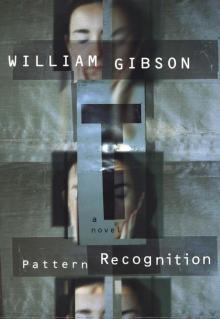 Pattern Recognition
Pattern Recognition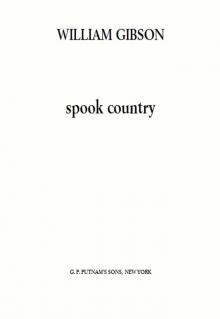 Spook Country
Spook Country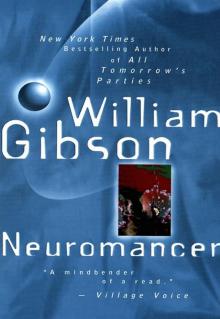 Neuromancer
Neuromancer Skinner's Room
Skinner's Room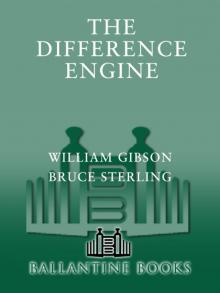 The Difference Engine
The Difference Engine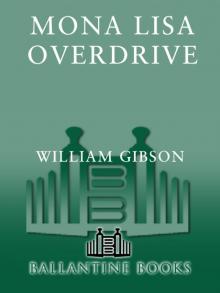 Mona Lisa Overdrive
Mona Lisa Overdrive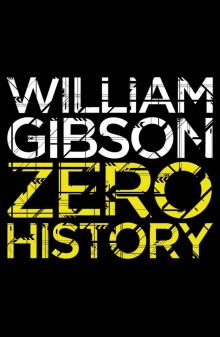 Zero History
Zero History The Peripheral
The Peripheral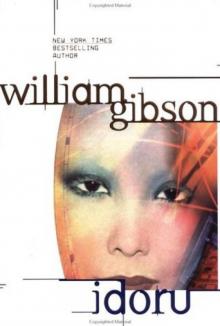 Idoru
Idoru Johnny Mnemonic
Johnny Mnemonic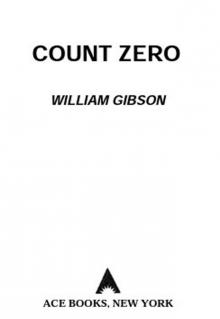 Count Zero
Count Zero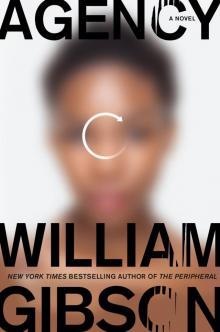 Agency
Agency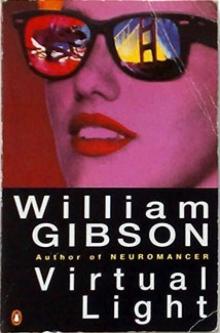 Virtual Light
Virtual Light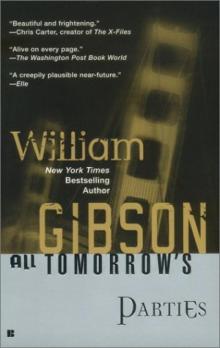 All Tomorrow's Parties
All Tomorrow's Parties The Miracle Worker
The Miracle Worker Disneyland with the Death Penalty
Disneyland with the Death Penalty Idoru tb-2
Idoru tb-2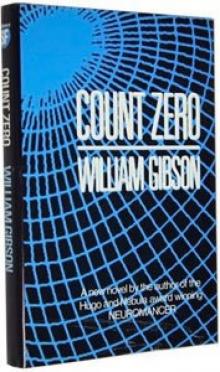 Count Zero s-2
Count Zero s-2 The Gernsback Continuum
The Gernsback Continuum New Rose hotel (tales)
New Rose hotel (tales)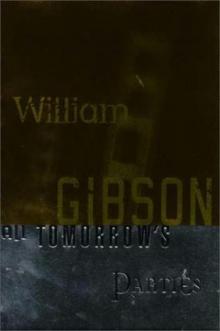 All Tomorrow's Parties bt-3
All Tomorrow's Parties bt-3 Hinterlands
Hinterlands Thirteen Views Of A Cardboard City
Thirteen Views Of A Cardboard City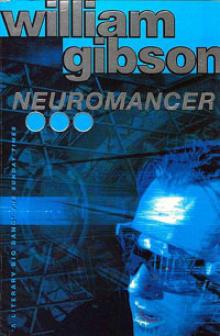 Neuromancer ts-1
Neuromancer ts-1 Virtual light b-1
Virtual light b-1